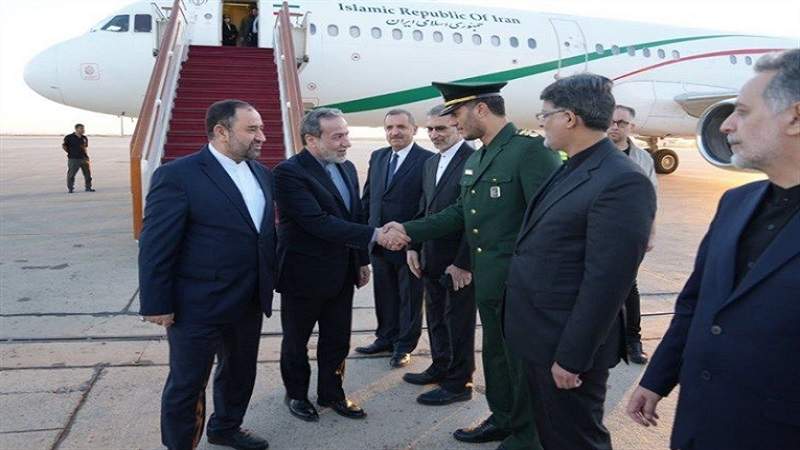Following the assassination of Hezbollah’s Secretary-General, the martyr and leader Sayyid Hassan Nasrallah, the Israeli entity imposed an air blockade, preventing an Iranian plane from landing at Beirut Airport. However, this blockade was short-lived. The initial Israeli excitement over its preparations to attack Lebanon quickly dissipated with the launch of Operation The True Promise 2. In its aftermath, Iran sent a series of messages asserting its indifference to Israeli threats.
Yesterday, the Iranian Foreign Minister visited Lebanon, accompanied by a fighter jet, boldly defying the Israeli occupation and daring it to take any reckless action—whether by bombings or attempts to block his arrival.
He landed in Beirut, a city under siege, delivering a clear and powerful message: Iran does not fear the "Israeli" rats.
Upon his arrival, a journalist asked: “Were you not afraid of coming to Beirut today, during the war?”
The minister replied: “We have witnessed situations like this many times. Last night, the Israeli occupation bombarded Beirut savagely, and before we arrived, they shelled an area near the airport. We are used to this, and our determination is far stronger than these threats.”
According to the Iranian Ambassador to Lebanon, Mojtaba Amani, Foreign Minister Araghchi's visit to Lebanon was both “bold and decisive,” arriving as Hezbollah and the Islamic Resistance in Lebanon rained missiles down on northern “Israel,” forcing Netanyahu into his bunker after strikes hit Caesarea.
Similarly, during Iranian President Pezeshkian’s visit to Doha, fighter jets escorted his plane due to concerns that the Israeli occupation might attempt an attack on the Iranian presidential aircraft during its return. Yet, “Israel” is too insignificant to carry out such an action directly.
Meanwhile, Iran’s Supreme Leader, Ayatollah Ali Khamenei, delivered his Friday sermon just three days after Iran’s resounding retaliation against “Israel.” He appeared in an open setting, with the event announced in advance, despite the enemy’s repeated threats toward Iran and its allies.
None of these threats had any impact, as shown by the gathering of high-ranking officials during the sermon—defying the chaos or any potential assassination attempts targeting Iran’s leadership.
This sermon sent Iran’s strongest message to the Israeli enemy since the latest version of The True Promise. Iran and the Resistance Axis remain undeterred by this fragile entity.
Khamenei’s appearance, with a Russian-made Dragunov sniper rifle by his side, and his eulogy for Sayyid Hassan Nasrallah, conveyed Iran’s unwavering commitment to confronting the Israeli entity and its backers with full force. This resolve persists despite warnings from the G7, which reaffirmed their explicit support for the occupying Israeli entity. The most recent True Promise operation was a clear message about the future of the temporary “Israeli” regime.
Iran’s meticulous preparation for Operation "The True Promise 2", primarily targeted military and security installations. As Iranian leaders have stated, they have plans for something even harsher, more far-reaching, and destructive, which may surpass the imagination of the Israeli entity and its supporters. This plan includes strikes on vital, strategic infrastructure.
As The Wall Street Journal pointed out, any new Iranian strikes on “Israel” could have far graver consequences, especially if they target infrastructure or residential areas.
The newspaper noted that striking the “Nevatim” airbase, a heavily fortified installation deep in the desert, would be much more complex than attacking basic infrastructure in residential areas.
According to The Guardian, Israeli security circles are increasingly anxious about the failure of their air defenses to intercept Iranian missiles. The British newspaper cited security sources within the Zionist entity, stating: “After the latest Iranian missile attack, Israeli security circles are worried that, in the event of a large-scale missile assault by Iran, Hezbollah or Iran’s regional allies could disable Israeli air defenses with ballistic missiles.”
More importantly, the limited scope of these Iranian strikes, as understood by the Israeli entity, was merely a final warning. The actual response will be catastrophic, resembling judgment day scenarios foretold in Jewish prophecy.
Former Israeli Prime Minister Ehud Barak acknowledges this dire reality: “Israel, which cannot handle 200 Iranian missiles, how will it cope with thousands of Iranian ballistic missiles?”
He continues, “This is madness, even with support from America and our allies.”
Barak concludes, “We simply do not have the capacity for this. War with Iran is the greatest folly of the current government, and the people must overthrow this insane government”







